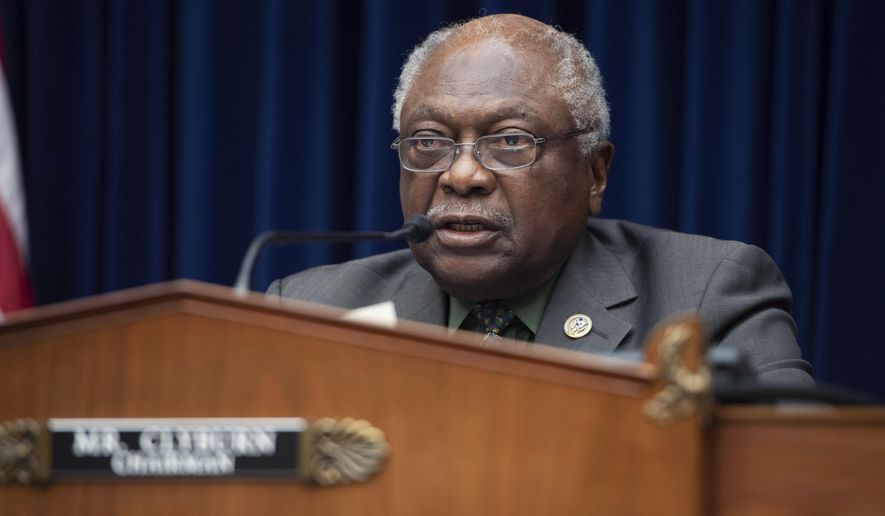House Majority Whip James Clyburn said Sunday that Democrats will “do what’s necessary” to reach a compromise on President Biden’s big-spending plan for families before a Sept. 27 vote on a parallel infrastructure package.
But he admitted there are deep divisions within the party and they might have to “stop the clock” and delay the roll call.
Progressives have threatened to vote against the physical infrastructure bill that got through the evenly divided Senate on a bipartisan vote unless they see a $3.5 trillion bill for social welfare programs that must pass under “budget reconciliation” to avoid a GOP filibuster and pass on Democratic votes alone.
“Our leadership is on this, we are working with everybody in all corners of our party to try to get to a common ground on all of these issues and I feel very comfortable that we’re going to get there,” Mr. Clyburn, South Carolina Democrat, told CNN’s “State of the Union.”
The path forward is unclear. Even as left-wing members demand social spending, moderates in the House and Senates are skittish about the cost of that package and want to secure the bipartisan victory on roads and bridges.
Sen. Joe Manchin III of West Virginia, a key Democratic vote needed for the families plan, reportedly told the president to his face in a private meeting Thursday that he won’t support the huge price tag.
But Sen. Bernard Sanders, a Vermont independent and leading progressive voice, said Sunday his camp already compromised by coming down from $6 trillion in social spending to $3.5 trillion.
“It is a complicated proposal,” Mr. Sanders told CBS’s “Face the Nation. “All I am telling you is that $3.5 trillion is much too low, a compromise has already been made, an agreement has been made.”
Mr. Clyburn said he has “no idea” what the final cost of a compromise might be. He said the party needs to stop talking about the overall cost and focus on what needs to get done. He said the “real expense” is not tackling their checklist.
“We cannot continue with this pandemic, we’ve got to spend the money that’s necessary to get beyond it. We’ve got to do something about our infrastructure. Bridges are breaking down all over and we’ve got to do something about it.”
Mr. Clyburn downplayed the obvious roadblocks to getting to a solution, characterizing it as the type of discussion a family has in the pursuit of common ground.
“We have a pretty big tent in our party. We have progressives that are very, very important not just to the party but to the country, and we have moderates and that’s how it should be. We reflect what this country is all about,” he said. “I’m comfortable with where we are.”
Mr. Sanders said Democrats faced a similar challenge during the debate over a coronavirus-relief package that got across the finish line. He said the public urged them to get a result.
“The Americans people, by the way, in poll after poll after poll, are telling us — now is the time to stand up to powerful special interests. Now is the time to start representing working families,” he said. “It’s an enormous fight, we’re going to win it.”
Complicating matters is a looming deadline to raise the debt limit so the U.S. doesn’t default on the costs incurred by prior spending.
Mr. Clyburn said Democrats would like to see Republican cooperation but will rely on a party-line vote within a reconciliation bill if they have to.
“I’m not fine with that, but if that’s what it takes, that’s what it will take,” Mr. Clyburn said, betting the public will see GOP opposition as political chicanery. “The American people will see what the Republicans are doing on this front as well.”
• Tom Howell Jr. can be reached at thowell@washingtontimes.com.




Please read our comment policy before commenting.